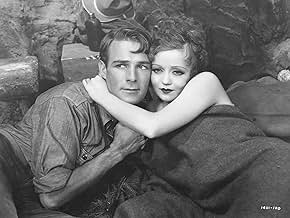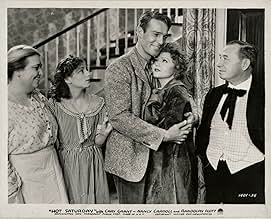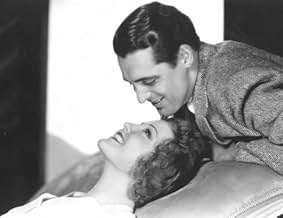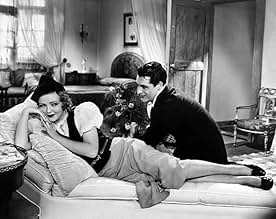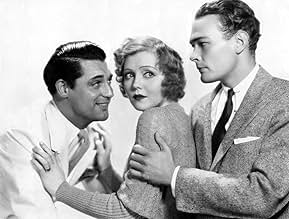VALUTAZIONE IMDb
6,5/10
1467
LA TUA VALUTAZIONE
Aggiungi una trama nella tua linguaA pretty but virtuous small-town bank clerk is the victim of a vicious rumor from an unsuccessful suitor that she spent the night with a notorious womanizer.A pretty but virtuous small-town bank clerk is the victim of a vicious rumor from an unsuccessful suitor that she spent the night with a notorious womanizer.A pretty but virtuous small-town bank clerk is the victim of a vicious rumor from an unsuccessful suitor that she spent the night with a notorious womanizer.
- Regia
- Sceneggiatura
- Star
Lilian Bond
- Eva Randolph
- (as Lillian Bond)
Nora Cecil
- Gossip on Telephone
- (non citato nei titoli originali)
Billy Engle
- Third Bank Customer
- (non citato nei titoli originali)
Kenner G. Kemp
- Party Guest
- (non citato nei titoli originali)
Marjorie Main
- Gossip in Window
- (non citato nei titoli originali)
Dave O'Brien
- Party Guest
- (non citato nei titoli originali)
Recensioni in evidenza
Aside from the silly and gratuitous underwear scene, this movie does a good job of telling the story of poor Ruth Brock, a hard-working, put-upon small town girl who is judged and persecuted by her neighbors and so-called friends following a day of fun on an eponymous 'Hot Saturday' in the summer of 1932.
Subsequent events show how much women had staked on maintaining their reputations at that time, a topic that didn't go away with the enforcement of the production code though it lost a lot of its nuance. The expression on Ruth's face in the last frame of this film is so uncertain...she doesn't know if she's doing the right thing, doesn't know quite what she's getting into. I grieve for the loss of that ambiguity in films made in the years to come.
Nancy Carroll is brilliant in the role of Ruth, sparing the audience tedious hysterics and instead portraying the bitterness and frustration of living in a town of petty fools with nothing better to do than tear each other apart. I sort of wish there were two versions of this movie, one starring Carroll and one starring Barbara Stanwyck so I could do a side-by-side comparison. Stanwyck did such a good job with offended righteousness in 'Night Nurse'. But I'd keep Cary Grant in both...young and perfectly cast in the role of the local "disreputable cad" (that's how he's described (aptly) on the label).
But even a disreputable cad can have good points...and keen-eyed, truthful, pre-production code Ruth won't fail to notice them...
Subsequent events show how much women had staked on maintaining their reputations at that time, a topic that didn't go away with the enforcement of the production code though it lost a lot of its nuance. The expression on Ruth's face in the last frame of this film is so uncertain...she doesn't know if she's doing the right thing, doesn't know quite what she's getting into. I grieve for the loss of that ambiguity in films made in the years to come.
Nancy Carroll is brilliant in the role of Ruth, sparing the audience tedious hysterics and instead portraying the bitterness and frustration of living in a town of petty fools with nothing better to do than tear each other apart. I sort of wish there were two versions of this movie, one starring Carroll and one starring Barbara Stanwyck so I could do a side-by-side comparison. Stanwyck did such a good job with offended righteousness in 'Night Nurse'. But I'd keep Cary Grant in both...young and perfectly cast in the role of the local "disreputable cad" (that's how he's described (aptly) on the label).
But even a disreputable cad can have good points...and keen-eyed, truthful, pre-production code Ruth won't fail to notice them...
Hot Saturday (1932)
There are a few early Cary Grant movies where he has a small role, or where he isn't quite the "Cary Grant" we have come to expect (and which he always jokingly said he wanted to become himself). But this one is pure, true Grant, and very early, indeed. But even better, the plot, the mise-en-scene (including town scenes, domestic situations, and a range of outdoor stuff at the lake including a bohemian roadhouse on the water), and the photography are amazing. I mean amazing. There are a few stumbles in the acting, but you get so swept along, and so continually surprised, this won't matter much at all.
The director of all this gets a huge amount of credit, because William Seiter who pulls the best out of the cast and the crew, equally--and who presumably helped choose some terrific location shots as well as matching studio scenes. Seiter was a Hollywood working man director, doing lesser A-list films and making them decent, though none that I've seen (a small fraction of a huge output from the 20s to the 40s) has the energy and flair of this one. And this is an unsung one, definitely worth seeking out.
Likewise, Arthur Todd behind the camera did a dumpload of good if unamazing films, and so it was with the music and set design. But the leading lady is another story. Nancy Carroll really steals the show, even from Grant and the other leading male, the rather wooden and handsome Randolph Scott. She has a kind of live-wire, doll-face quality a little similar to Claudette Colbert, easily as amazing in this film. Carroll supposedly had more fan mail than any actress in this era of Hollywood, and was contracted with Paramount (which was the studio here). But she was so difficult to work with offscreen (rejecting many parts) they let her go, and her career slid, and she probably missed out on another higher kind of stardom.
But here she is alive, sympathetic, and complex on screen. If Cary Grant isn't enough to lure you in, give Carroll her due.
This is of course a pre-code film (widely advertised as such) and in fact the looseness of the events, the morality of the lead, and the suggestive scenes (never explicit) all help make this come alive. The dance and party scenes are so much fun you'll wish you were there, and the cave in the storm as well as the night scenes in the woods are pretty amazing, too. The end will prove, again, both the ability of pre-code films to touch on real life issues, and the need of even these kinds of films to have a moral compass by the end. The very last few seconds takes care of this.
Great stuff. A huge surprise for me.
There are a few early Cary Grant movies where he has a small role, or where he isn't quite the "Cary Grant" we have come to expect (and which he always jokingly said he wanted to become himself). But this one is pure, true Grant, and very early, indeed. But even better, the plot, the mise-en-scene (including town scenes, domestic situations, and a range of outdoor stuff at the lake including a bohemian roadhouse on the water), and the photography are amazing. I mean amazing. There are a few stumbles in the acting, but you get so swept along, and so continually surprised, this won't matter much at all.
The director of all this gets a huge amount of credit, because William Seiter who pulls the best out of the cast and the crew, equally--and who presumably helped choose some terrific location shots as well as matching studio scenes. Seiter was a Hollywood working man director, doing lesser A-list films and making them decent, though none that I've seen (a small fraction of a huge output from the 20s to the 40s) has the energy and flair of this one. And this is an unsung one, definitely worth seeking out.
Likewise, Arthur Todd behind the camera did a dumpload of good if unamazing films, and so it was with the music and set design. But the leading lady is another story. Nancy Carroll really steals the show, even from Grant and the other leading male, the rather wooden and handsome Randolph Scott. She has a kind of live-wire, doll-face quality a little similar to Claudette Colbert, easily as amazing in this film. Carroll supposedly had more fan mail than any actress in this era of Hollywood, and was contracted with Paramount (which was the studio here). But she was so difficult to work with offscreen (rejecting many parts) they let her go, and her career slid, and she probably missed out on another higher kind of stardom.
But here she is alive, sympathetic, and complex on screen. If Cary Grant isn't enough to lure you in, give Carroll her due.
This is of course a pre-code film (widely advertised as such) and in fact the looseness of the events, the morality of the lead, and the suggestive scenes (never explicit) all help make this come alive. The dance and party scenes are so much fun you'll wish you were there, and the cave in the storm as well as the night scenes in the woods are pretty amazing, too. The end will prove, again, both the ability of pre-code films to touch on real life issues, and the need of even these kinds of films to have a moral compass by the end. The very last few seconds takes care of this.
Great stuff. A huge surprise for me.
Small town 'nice' girl (Nancy Carroll) becomes victim of rumors that she spent the night with wealthy playboy (Cary Grant). Because of this she loses her job and her boyfriend (Randolph Scott). Decent Pre-Coder with some risqué subject matter. Love the funny scene where Nancy Carroll wrestles her younger sister and removes her underwear. Carroll is cute and has good chemistry with Grant. Cary's very charming even this early in his career. Scott's fine, too. Jane Darwell plays Carroll's shrewish mother. Nice production and small town atmosphere. I saw this on TCM and the print is exceptionally good for a movie this old.
10sws-3
Nancy Carroll shines as an innocent woman nearly destroyed by >gossip in this very unflattering portrait of small town America. >Now forgotten, Carroll brings sensitivity, depth, and humor to >her performance. An inexperienced but effective Cary Grant is a >man with charm and without conventional morals. The ending is a >surprise.
In small town America, everyone knows everyone else's business, and gossip flies fast. That's why bank teller Nancy Carroll is careful to go out in a big group and never stay out too late. She's usually glad to have a good reputation; but when she has a bad day at the office and her parents won't stop fighting, she doesn't care anymore. She goes out in a big group one Saturday night, but she openly flirts with notorious playboy Cary Grant. When her escort takes her out on the lake for some private time, she wiggles free and runs off to be with Cary instead! Do you think that'll send the gossip mill running?
Although he gets a higher billing, Randolph Scott has a much smaller part than Cary Grant. Cary is the "ungettable get" with tons of money and nothing to do. His pre-stardom makeup makes him look very weird, however, and if you look closely you can get a glimpse of his old teeth. When Scottie McScottie Pants comes on the scene, he's just gorgeous. Messy hair flopping in his face, smiles for miles, and a passion for geology even though there's no money in it. He's got my vote! But who would you pick? Watch this old movie for some pre-Code giggles and a very old-fashioned premise. Nancy Carroll is just as cute as it gets; I wonder why didn't become as big a star as her contemporaries like Carole Lombard or Jean Harlow.
Although he gets a higher billing, Randolph Scott has a much smaller part than Cary Grant. Cary is the "ungettable get" with tons of money and nothing to do. His pre-stardom makeup makes him look very weird, however, and if you look closely you can get a glimpse of his old teeth. When Scottie McScottie Pants comes on the scene, he's just gorgeous. Messy hair flopping in his face, smiles for miles, and a passion for geology even though there's no money in it. He's got my vote! But who would you pick? Watch this old movie for some pre-Code giggles and a very old-fashioned premise. Nancy Carroll is just as cute as it gets; I wonder why didn't become as big a star as her contemporaries like Carole Lombard or Jean Harlow.
Lo sapevi?
- QuizThis was Cary Grant's first role as a leading man.
- BlooperWhen Conny Billop signs his name in Ruth's date planner, he spells it "Connie", but in the credits the character's name is listed as Conny.
- Citazioni
Ruth Brock: Is Listerine good for brains?
Romer Sheffield: Love they tell me is better.
- Curiosità sui crediti(Opening titles) Marysville boasted of one bank, two fire engines, four street cars, and a busy telephone exchange. Everyone knew on Sunday what everyone else did on Saturday... and the rest of the week.
- ConnessioniFeatured in Hollywood: The Gift of Laughter (1982)
- Colonne sonoreIsn't It Romantic?
(uncredited)
Written by Richard Rodgers and Lorenz Hart
Heard on soundtrack when Carroll arrives at Grant's house.
I più visti
Accedi per valutare e creare un elenco di titoli salvati per ottenere consigli personalizzati
- How long is Hot Saturday?Powered by Alexa
Dettagli
- Tempo di esecuzione
- 1h 13min(73 min)
- Colore
- Proporzioni
- 1.37 : 1
Contribuisci a questa pagina
Suggerisci una modifica o aggiungi i contenuti mancanti

